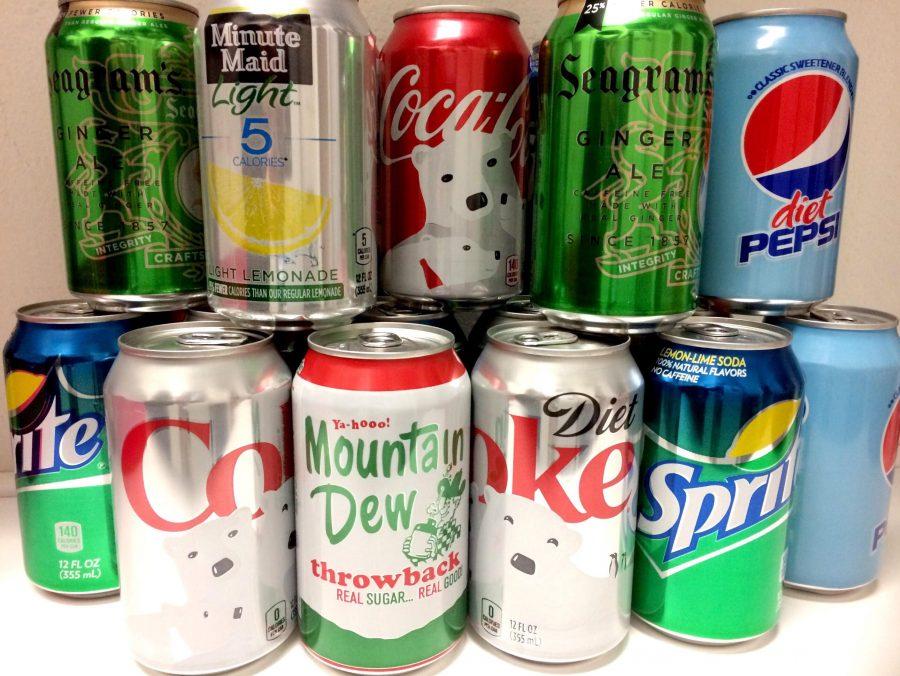How America is slowly cutting out soda
You’re at work and after hours of continuous toil, you decide you need a break. You locate the nearest vending machine, hoping for a cold Pepsi or maybe a refreshing Mountain Dew, but instead, you’re shocked to find it filled with bottled water and natural fruit juices.
This is the case for several cities in the United States in the workplace as well as at colleges and schools. The removal, replacement, and taxing of sugary beverages in offices and universities has caused quite a rumble within several soft drink companies. While sodas have held a high rank in sales over other drinks in the past, recently, their popularity has been steadily declining due to new studies that linked them with various problems among people of all ages, including obesity and sleep deprivation.
Aside from utilizing the internet for publicity and attention, soft drink corporations also promote sales of their products in schools. Companies pay schools to have their vending machines kept throughout the halls, and by doing this, schools are provided with a source of funding. Other ways that businesses boost their sales include campaigning and expanding across borders. Programs such as Coca-Cola’s Share a Coke project connect personally to consumers, which in turn persuades them to buy more of the product being sold. Statistics from each company’s website showed that internationally, both PepsiCo and Coca-Cola made a large portion of their revenues. Coca-Cola gained about 58% of its profits and PepsiCo derived around 49% from around the world. All of these marketing ideas, and many others, are what helped beverage companies develop into empires. So, what changed?
Business advancement has an effect on a multitude of different things, depending on what the focus of those businesses is. In this case, as sales in sugary drinks rose, so did some negative trends. Obesity, sleep loss, and even metabolic syndrome, that is, numerous conditions that increase the risk of diabetes, stroke, and heart disease also showed signs of escalation. The outcomes of experiments conducted by University of California San Francisco revealed that the consumption of sugar-sweetened beverages has a link to sleep deprivation, corpulence (the state of being overweight), and other diseases. Many cities initiated efforts to find a solution to this growing problem and from this sparked the idea to add taxes to or simply remove soft drinks in order to lessen their sales. In October, the World Health Organization urged cities and countries to impose taxes on sugar-sweetened drinks, and their research later showed that just a 20% increase in soda prices reduced their consumption greatly.
Nonetheless, the decisions on the issue are far from finalized. There has been much controversy over the matter, as clearly seen in Philadelphia when the mayor proposed a tax with the aim to eliminate the negative effects of sweetened beverages while efficiently provide money for several community activities. Opponents of the tax believe that sugary drink consumption can and will decrease on its own, and taxes wouldn’t provide a steady source of income. Moreover, companies within the soft drink industry, mainly Coca-Cola and PepsiCo, have been fighting against the tax, claiming that taxing soda was illegal. The battle over soda sales continues, as the banning and taxing of soft drinks has had a positive impact on some and a negative impact on others.
Still, there have been signs that a transition into a healthier lifestyle is already underway. At the University of California, San Francisco, a number of people included in the study were interviewed afterward. They all came to the same conclusion: they’ve begun to choose beverages without sugar over those that have added sweetening. People have gotten used to drinking water, diet drinks, or 100% fruit juices with no added sugar as opposed to sodas, sports drinks, and other similar beverages. One reason why this occurred is because of the decline in the promotion of them. For example, fast-food restaurants that oblige to the restriction started with a slight dip in beverage sales, but recovered quickly as more and more people bought replacements for sugary drinks that are more nourishing.
Overall, people are generally living healthier lifestyles because the temptation to buy unhealthy drinks no longer exists in several environments due to the new measures.


